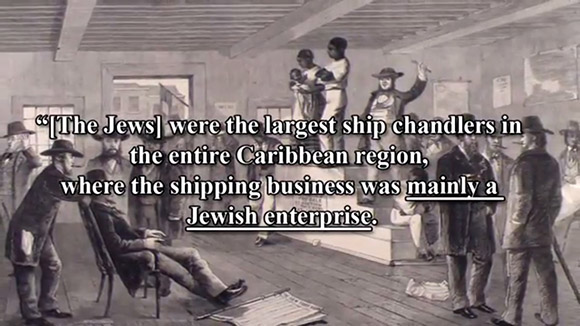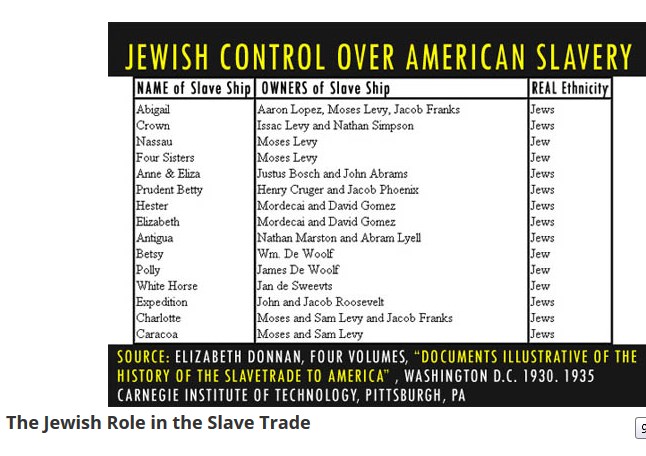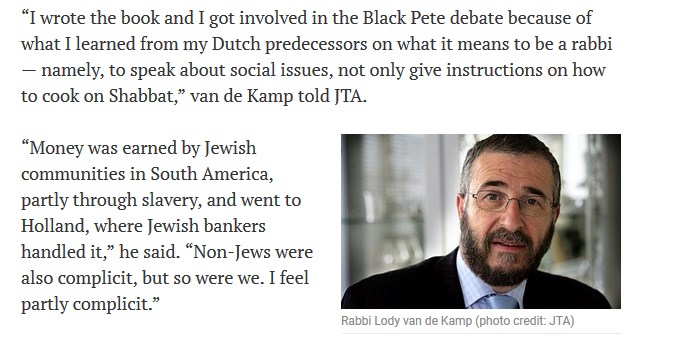A new book called The Jewish Slave, written by an orthodox rabbi in the Netherlands, has once again highlighted the role played by Jewish extremists in the African slave trade.

According to a report in the Jewish Telegraphic Agency (JTA) and the Jewish Journal, the book will “remind[ing] Dutch Jews of their ancestors’ deep involvement in the slave trade.”
Written by Rabbi Lody van de Kamp, the book was sparked off by the ongoing controversy over an old Dutch Christmas tradition known as “Zwarte Piet” (Black Pete)—a mischievous character who accompanies the Dutch version of Father Christmas around Holland as his assistant.
Even though Zwarte Piet is actually supposed to be an elfish character whose black face is the result of his working in a coal mine, black activists in the Netherlands have claimed that it is in reality a racial parody of black people (which it is not).
Nonetheless, Rabbi Van de Kamp has joined the chorus calling for the abolition of Zwarte Piet, and at the same time, revealed that the Dutch Jewish community also has a Zwarte Piet tradition of its own, called “Hanukklaas.”
The article in the Jewish Journal is titled “How culpable were Dutch Jews in the slave trade?” and says that Rabbi Van de Kamp criticized the Zwarte Piet tradition on Republiek Allochtonie, a black news-and-opinion website based in the Netherlands.
On that site, Rabbi Van der Kamp wrote that the “portrayal of ‘Peter the slave’ dates back to a period when we as citizens did not meet the social criteria that bind us today.
“Speaking out against Black Pete is part of my social mission, an effort that extends to reminding Dutch Jews of their ancestors’ deep involvement in the slave trade,” the article continued.
Referring to his new book on the Jewish role in the African slave trade, Rabbi van der Kamp said that “Money was earned by Jewish communities in South America, partly through slavery, and went to Holland, where Jewish bankers handled it.”
In researching the book, Rabbi Van de Kamp said he discovered data that shocked him.
“In one area of what used to be Dutch Guyana, 40 Jewish-owned plantations were home to a total population of at least 5,000 slaves,” he says.
“Known as the Jodensavanne, or Jewish Savannah, the area had a Jewish community of several hundred before its destruction in a slave uprising in 1832. Nearly all of them immigrated to Holland, bringing their accumulated wealth with them.
“Some of that wealth was on display last year in the cellar of Amsterdam’s Portuguese Synagogue, part of an exhibition celebrating the riches of the synagogue’s immigrant founders.”
Rabbi Van de Kamp says the exhibition sparked his interest in the Dutch Jewish role in slavery, which, he says, was “robust.”
According to research, on the Caribbean island of Curacao, Dutch Jews may have accounted for the resale of at least 15,000 slaves landed by Dutch transatlantic traders, according to Seymour Drescher, a historian at the University of Pittsburgh.
Jews were so influential in those colonies that slave auctions scheduled to take place on Jewish holidays often were postponed, according to Marc Lee Raphael, a professor of Judaic studies at the College of William & Mary.
Dr David Duke has dealt with the issue of Jewish involvement in the Trans-Atlantic slave trade in two remarkable videos, which are “must-see” material and can be viewed below:
Related
"The White race is to be condemned in the liberal press for having had slaves over a 150 years ago in the United States. Why are the Jewish people not condemned for their leading role in the slave trade over the last 2000 years?" Another question for David Duke and…
April 21, 2008
In “Politics”
"If the White race is to be condemned in the liberal press for having had slaves, why are the Jewish people not condemned for their leading role in the slave trade over the last 2000 years?" Another question for David Duke and his answer! Mr. Duke, you mention the White…
July 27, 2015
In “Human Diversity”

By Jeff Davis
August 27th, 2006
The “official” history of slavery seems to deviate little from “Uncle Tom’s Cabin” or the latest propaganda film from Steven Spielberg. People are left to assume that White Christians were involved in the most evil part of slavery, the shipping of slaves. The truth is that Christian nations were repelled at the cruelty associated with the importation of slaves and that was the first part of slavery outlawed by Christian nations. The one people who controlled and profited the most from shipping Blacks as if they were cattle, packing as many as possible onto slave ships were the Jews.
Now, of all people, a Jewish feminist historian named Natalie Zemon Davis has written a book on a subject which has up until now been strictly off limits to historians and scholars–Jews and their role in the slave trade and in slave ownership. Davis uses as her starting point the life and times of one Jewish physician who also made big bucks (or in his case, big guilders) in the slave trade during the 18th century, David Isaac Cohen Nassy, a resident and merchant prince of the Dutch colony in Surinam in South America, where tens of thousands of black African slaves lived and toiled in the sugar cane fields and the steaming, fever and snake-infested jungles under conditions that made a plantation in Virginia or domestic service in Massachusetts look like paradise.
According to an article in The Jewish Forward, the largest and most prestigious Jewish newspaper in America, “…Nassy was not an anomaly. Of the hundreds of Portuguese and Dutch settlers who traveled to the small plot of land just north of Brazil, almost a third were Jewish. And almost all had slaves. Surinam provided a choice example to exhibit this intermixing — if not for the abundant paper trail that Nassy left behind, then for the sheer exoticism of the place…Sephardic Jews from Portugal had lived on the land and were some of the colony’s first owners of slave-run sugar plantations. By the early 18th century, when Nassy lived…Jews were also granted autonomy and maintained their own legal system and militia, whose largest task involved capturing runaway slaves called maroons.” In other words, the Dutch colonial authorities contracted the lucrative racket of “slave-catching” to the Jews.
The connection between Jews and slavery was known even prior to the Civil War, and it is interesting to note that the Jews, as always, were on the side that could make them the quickest buck. One of the major advocates of slavery in the South was “Major” Mordecai Manuel Noah (1785-1851.) He was considered the most distinguished Jewish layman in his time. He was such a prolific proponent of slavery, that the first negro periodical, The Freedom Journal, was launched in response to Noah’s activities, including “To emancipate the slaves would be to jeopardize the safety of the whole country.” The Freedom Journal called Noah the black man’s “bitterest enemy” and William Lloyd Garrison, the leading White abolitionist, called him the “lineal descendant of the monsters who nailed Jesus to the cross.” (From the banned book: The Secret History of Blacks and Jews)
The annual Report of the American and Foreign Anti-Slavery Society for the year 1853 stated: The American and Foreign Anti-Slavery Society Report of 1853 “The Jews of the United States have never taken any steps whatever with regard to the slavery question. As citizens, they deem it their policy to have every one choose which ever side he may deem best to promote his own interests and the welfare of his country. They have no organization of an ecclesiastical body to represent their general views; no General Assembly, or its equivalent. The American Jews have two newspapers, but they do not interfere in any discussion which is not material to their religion. It cannot be said that the Jews have formed any denominational opinion on the subject of American slavery….The objects of so much mean prejudice and unrighteous oppression as the Jews have been for ages, surely they, it would seem, more than any other denomination, ought to be the enemies of caste, and friends of universal freedom.”
Jewish attorney and historian Seymour B. Liebman has written: “They came with ships carrying African blacks to be sold as slaves. The traffic in slaves was a royal monopoly, and the Jews were often appointed as agents for the Crown in their sale….[They] were the largest ship chandlers in the entire Caribbean region, where the shipping business was mainly a Jewish enterprise….The ships were not only owned by Jews, but were manned by Jewish crews and sailed under the command of Jewish captains.” [New World Jewry 1493-1825: Requiem for the Forgotten (KTAV, New York, 1982), pp. 170, 183.]
Essentially, the infamous “Middle Passage” was largely a Jewish racket. The Jews owned the ships and Liebman notwithstanding, it was assorted Gentiles sailed in them and took all the risks from storms, African tribesmen, slave revolts on board, and the terrible fevers of the disease-ridden West African tropics. The Jews handled the sale once the negroes had arrived in the Americas, usually the West Indies or Cuba or Surinam or Brazil. (The actual importation of blacks right off the boat from Africa into the thirteen British colonies was comparatively rare; most American slaves came from Cuba or the West Indies and had already been slaves for several generations when they arrived here. Importation of foreign slaves into the United States was outlawed by Congress in 1808.)
The truth is out there about the origins of American slavery. The big question is “How long will the Jewish role in slavery be hidden?”
Source: WhiteCivilRights.com
* [EURO columnists; Jeff Davis, James Buchanan, Ian Mosley and Charles Coughlin are just a few of the excellent writers that you will find regularly featured on DavidDuke.com’s sister site: WhiteCivilRights.com — put WhiteCivilRights.com in your favorites column!]
Staff
Related
"The White race is to be condemned in the liberal press for having had slaves over a 150 years ago in the United States. Why are the Jewish people not condemned for their leading role in the slave trade over the last 2000 years?" Another question for David Duke and…
April 21, 2008
In “Politics”
"If the White race is to be condemned in the liberal press for having had slaves, why are the Jewish people not condemned for their leading role in the slave trade over the last 2000 years?" Another question for David Duke and his answer! Mr. Duke, you mention the White…
July 27, 2015
In “Human Diversity”
Israel: Whore House of the Middle East By Rev. Ted Pike November 8th, 2006 My article “Israel: On the Way to Empire in the Mideast” documents from Scripture an astonishing fact: Israel today is the symbolic “Mother of harlots” described in Revelation 17 and 18. Ancient Israel was first to…
November 11, 2006
In “Politics”
Share:
August 26, 2006
In “Politics”







